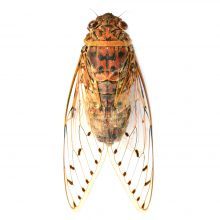By Gwen Rockwood, newspaper columnist and Northwest Arkansas mama of 3
Welcome to the year of the bug. We’re just in time to witness two giant broods of cicadas rising from the ground like a horde of zombie bugs. How many zombie bugs? Definitely billions. But most likely trillions. There’s no official tree-to-tree cicada census, so it’s hard to be sure.
But we’re sure they’re here because they’re loud – so loud that some people have called the police to make noise complaints about the roaring, whining sound that scientists say registers at about the same decibel level as a lawnmower or a jet flying overhead.
No matter how noisy it gets, police can’t do anything about it. There’s not enough departmental funding to buy teeny tiny cicada handcuffs that only get used every 13 years. That expense would never get approved by management. And even if police could lock up these bugs for having a raucous party, the cicadas would literally crawl out of their own skin and fly away – leaving nothing but a crunchy exoskeleton behind.
The collective roar we hear this year is much like the cicada equivalent of online dating. These cicadas have been alone underground for as long as 17 years, and now they’re desperate for a date. I read an article from the University of Wisconsin that said sometimes male cicadas form boy bands to attract the ladies. Then they start belting out a special “courtship song” when a pretty girl flies by. If she likes the song, she’ll flick her wings at the singer – the bug equivalent of swiping right.
It might sound like fun and games, but cicadas must dodge plenty of predators while they look for love. Birds anticipate the emergence of cicadas rising from the ground the same way some people look forward to the grand opening of a Golden Corral. It’s an all-you-can-catch-and-eat mega buffet – minus the chocolate fountain. And it’s not just birds who chow down. Wasps, spiders, fish, reptiles, and even some mammals enjoy a crunchy cicada snack every chance they get.
But cicadas are lovers, not fighters. They can’t sting. They’re not poisonous. And their mouth parts can’t even bite. All a guy can do is try to stay alive long enough to find a love connection with a good-looking cicada who likes his music and flicks a wing in his direction.
The cicadas’ loud love story begins and ends in a relatively short period of time – about four to six weeks. After mating and laying eggs, the cicadas rapidly age, die, and fall to the ground, perhaps clutching each other in tragic Romeo and Juliet fashion.
At least their love will live on in future generations. Eggs will hatch. Baby cicadas will burrow. They’ll grow silently in the soil for 13 or 17 years. And then one day, years from now when the dirt gets warm enough, they’ll rise out of the ground to honor the great love stories of their ancestors. They’ll shed their skin and sing their cicada hearts out. They’ll flirt and flick wings. And maybe they’ll find a match.
Who among us can blame them? We all do crazy things for love.
Gwen Rockwood is a syndicated freelance columnist. Email her at gwenrockwood5@gmail.com. Her book is available on Amazon.
